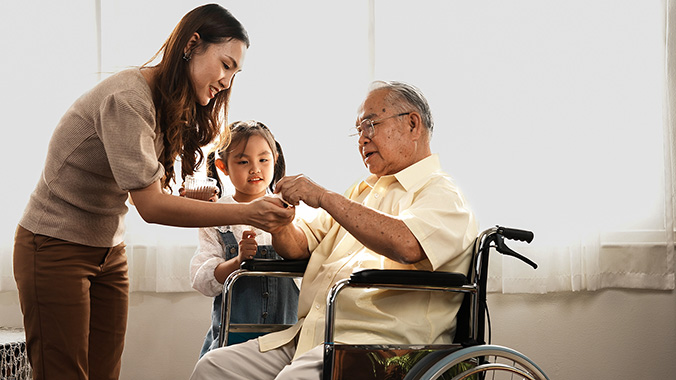I often receive questions about my parents’ wellbeing. “How’s Ms. Ruby?” “How’s Mr. Daniel?” Today, I was surprised to be asked, “How are YOU?” The person followed that question with, “I know your parents are alright, but how are YOU really doing? Are you taking some time for yourself?”
That person understood the journey, as she had walked this path while caring for her mother several years ago. Her sincerity and genuine concern moved me. I nearly broke down because I felt that she understood the struggle. It seemed like she sensed my weary spirit, although I was focused on trying to be a good, upbeat host.
I imagine that such concern, and a desire to draw attention to caregivers’ struggles, led to the observance of National Family Caregivers Month. Every year since 1997, November has been designated a time to honor and recognize family caregivers in the United States. It presents an opportunity to garner support for caregivers by increasing public awareness about the issues they face.
In observance of National Family Caregivers Month, I would like to provide a few facts about family caregivers and offer some helpful suggestions.
FIRST, SOME FACTS ABOUT CAREGIVING
- Nearly 40 million caregivers care for adults with a disability or illness (caregiver. org).
- Nearly 16 million family caregivers care for a loved one who lives with Alzheimer’s or another form of dementia, as reported by caregiver statistics website.
- In general, older Americans are living longer. Consequently, the number of (unpaid) family caregivers is expected to grow exponentially over the next 50 years compared to the past.
- Although dementia is not considered a normal part of aging, we can anticipate more caregivers providing care for older individuals with this condition.
HOW WOMEN ARE MOST IMPACTED BY CAREGIVING
- The typical family caregiver is a woman.
- More women (more than half all individuals) receive care from a family caregiver than men.
- Women are usually older than men when they receive care.
- The woman, on average, spends more time providing care than the male caregiver.
- Older women outnumber older men by 6 million, according to the 2017 Profile of Older Americans.
- Women are projected to outlive men by two-and-a-half years.
- •The average caregiver is a woman in her 50s who works full time and has children and/or grandchildren, among other responsibilities. This woman also may have developed chronic illness and poor eating and exercise habits and is more likely to show symptoms of depression (National Alliance on Caregiving). The Alzheimer’s Association, in its 2023 Alzheimer’s Disease Facts and Figures report, suggests that this may be because women spend more time caring for their loved ones and handle more caregiving tasks.
HOW TO SUPPORT A FAMILY CAREGIVER
- Check on the caregiver’s wellbeing, not just those for whom she is providing care.
- Encourage her to engage in self-care activities.
- Insist that she take advantage of respite care, which gives caregivers a break by providing short-term care services to their loved one in a facility or at home. It is like a couple hiring a babysitter so they can enjoy a date night.
- Invite the caregiver to join you at the spa, movie theater or restaurant, or invite her over just to relax.
- Ask her to join you for Pilates and brunch or some fitness activity.
- Help her prepare a meal.
- Volunteer to drive her to an appointment.
- Offer a listening ear.
- Share resources that can help lighten her load.
- Send her encouragement by text, card, email or DM, or gift her a little “happy” of her favorite things.
- Respect when she needs space.
- Make her laugh to take her mind off her challenges.
HOW TO SIMPLIFY YOUR CAREGIVING DUTIES
Here are some tools and services that have made caring for my parents easier:
- Grocery delivery: Many grocery stores and discount supermarkets offer delivery for a low subscription fee or per-delivery fee that can be scheduled at your convenience. The app’s shopping cart can be filled as an item is needed or at one time.
- Prescription delivery and the pill pack: The pill pack service provided by a local pharmacy has been a lifesaver. It may just be my favorite convenience, as it removes the guesswork from gathering and sorting prescriptions and vitamins by placing all the pills in a small package labeled with the date and time the pack should be taken, along with the description and doses for each pill.
- Food delivery: We take advantage of the meal prep and delivery of a friend’s food service. This allows us to select from the menu of the day and pay before or after the meals are delivered. Because the meals are delivered by someone I know, I can remotely unlock the door to allow for hand-delivery to my parents.
- Telehealth appointments: Although they are not always available, I take advantage of these whenever possible. It saves me lots of time, as I don’t have to leave work as early to get my parents up and dressed or worry about finding a parking spot.
- Auto-delivery: Online auto-delivery of personal items that are routinely needed is very helpful, and we can cancel or suspend the deliveries at any time.
HOW TO OVERCOME CAREGIVER ANXIETY, FEAR AND GUILT
Caregivers who are feeling overwhelmed may find some peace through affirmations. Here are some suggestions:
- I am not perfect: I understand and acknowledge that I am not perfect. I am human and flawed. That reminder allows me to forgive myself when I don’t get it right, even though my goal is to always do right by them.
- It’s okay to grow tired: Being physically and mentally tired can lead to poor decision-making and cause illness. I realize that rest is needed to re-energize my body and mind and help make my journey smoother.
- Be realistic: I try to be realistic about my limitations. Although I think I am superwoman sometimes, I know it’s important to be aware of my strengths and weaknesses.
- Get help or accept help: Asking for or receiving help does not make you appear weak. Instead, it shows wisdom and gives others an opportunity to be of service to a good cause.
- Don’t worry about what others think about you: I know I have no control over what people think about me, so I try not to be concerned with that. I do what makes sense and what is best for me and my tribe. Who cares what everybody else thinks or says, especially if they aren’t helping the cause?
- Create balance: Striking a balance among work, caregiving, activities and self-care is very important and easier said than done. This is very important to prevent burnout and sickness.
HOW TO PLAN NOW FOR YOUR OWN FUTURE CAREGIVER
We should anticipate living longer and begin preparing for a time when we may need assistance due to diminished physical and/or mental capacity. Here are some suggestions:
- Begin by making a list of important people and things.
- Create a list of special friends and loved ones with their contact information (name, address, phone number, email address and social media handles).
- While you are still lucid, establish a will or trust to designate who does what and under what circumstances and who gets what.
- Create and safely store logins and passwords to access important accounts, then make sure someone knows how to locate that information.
- Make your wishes known. Do you want to stay in your home, the home of a loved one, a nursing home or an assisted living facility, etc. when you can no longer care for yourself completely?
- List all assets that must be managed or monitored.
- Begin adding trusted loved ones to financial accounts, policies, deeds, etc.
- Make a list of your healthcare providers, along with their locations and contact information.
- Authorize a loved one or two to receive disclosures from your health care providers regarding your care.
- List the person or people you want to manage your finances and care, then be sure to inform them.
- Create a list of insurance policies, policy numbers and contact information.
- Make sure a friend or loved one has a key or access to your home.
- If you have a pet, designate who will care for the pet.
This gift of assurance will greatly help the caregivers in charge of your care and ensure that your wishes are fulfilled.
And finally, I pose a challenge: Do something special for a family caregiver in your life this month. She certainly will appreciate your thoughtfulness!




